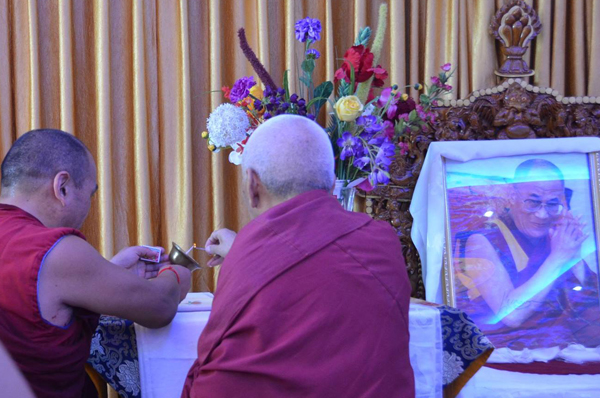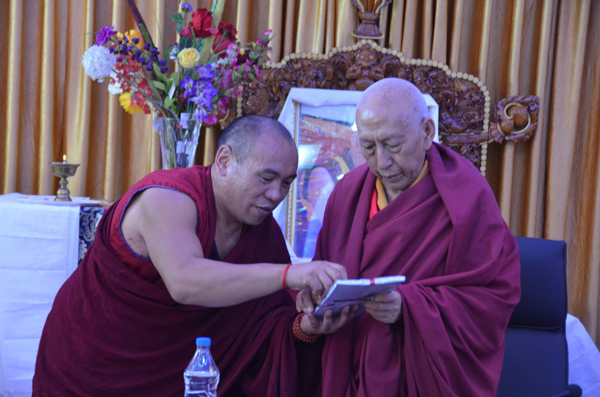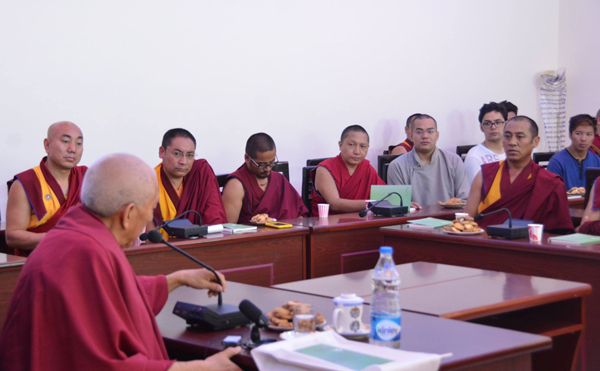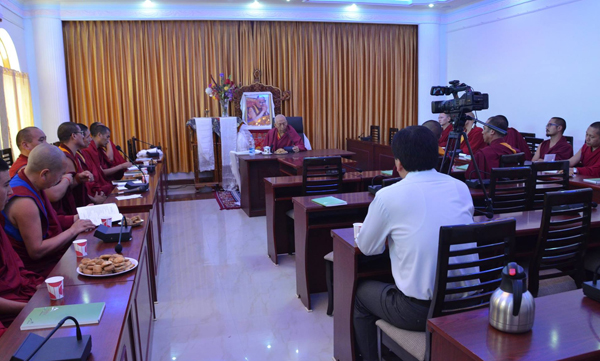Launch of a periodical on Behaviour
June 28, 2015 This morning, Prof. Samdhong Rinpoche attended, as the Chief Guest, the launch of the periodical Kunchoe (kun-spyod; Behaviour, Manners) at Kirti Benevolent Peace Hall, Dharamsala. The event began with Rinpoche lighting a ceremonial butter-lamp and then formally launching the periodical.
 Hardhong Ajig, Editor of Kunchoe, explained the objectives of starting the periodical. Thereafter, Prof. Samdhong Rinpoche gave a guidance talk on Behaviour (Kunchoe), beginning with explanation on the understanding of the term “kun-spyod” (behaviour; manners), how it had come in Tibetan from the Indian “charyā”, how it refers to several different things, depending on accompanying words, and how it mainly in the present context has the meaning as the process of a subject engaging in an object.
Hardhong Ajig, Editor of Kunchoe, explained the objectives of starting the periodical. Thereafter, Prof. Samdhong Rinpoche gave a guidance talk on Behaviour (Kunchoe), beginning with explanation on the understanding of the term “kun-spyod” (behaviour; manners), how it had come in Tibetan from the Indian “charyā”, how it refers to several different things, depending on accompanying words, and how it mainly in the present context has the meaning as the process of a subject engaging in an object.
If kunchoe is used as referring to morality, it refers to individual-liberation morality, thus it concerns the conduct of body and speech (physical and verbal conduct), Rinpoche explained. Likewise, Rinpoche pointed out, when there is a mention of “the four kinds of conduct” they are to be understood as referring to the conduct of body and speech.
 On the decline of ethics in society these days, Prof. Samdhong Rinpoche explained that the fluctuation—sometimes improving and sometimes deteriorating—in relationship between individuals, between societies, between races, and between nations, come about from the process of subject engaging in an object; such relationship between subject and object can be labelled as “behaviour”. The Sanskrit charyā and the Tibetan kun-spyod (kunchoe) are seen translated into English as “behaviour”, “activity”, and so forth, in a variety of rendering, depending on accompanying words, and that the reading of the meanings done by context, Rinpoche said.
On the decline of ethics in society these days, Prof. Samdhong Rinpoche explained that the fluctuation—sometimes improving and sometimes deteriorating—in relationship between individuals, between societies, between races, and between nations, come about from the process of subject engaging in an object; such relationship between subject and object can be labelled as “behaviour”. The Sanskrit charyā and the Tibetan kun-spyod (kunchoe) are seen translated into English as “behaviour”, “activity”, and so forth, in a variety of rendering, depending on accompanying words, and that the reading of the meanings done by context, Rinpoche said.
 The demarcating of good and bad behaviour, Rinpoche explained, is on the basis of the causal motive—the instigator of the behaviour—and the time-motive (motive at the time of a behaviour taking place). Both the Earlier and Latter Abhidharma teachings explain attachment, hatred and closed-mindedness (ignorance) as the roots of non-virtues, and absence of the three as the roots of virtues—as such, Rinpoche further explained, in any process of engagement by subject (ourselves) in an object (others), it is not possible for us ordinary beings to be devoid of conceptual thoughts in the background [motive of our behaviour]; if a behaviour is tainted with any of the three—attachment, hatred and closed-mindedness—or by all three, it becomes a bad behaviour, a non-virtuous behaviour, an unclean behaviour; and the terms “clean behaviour” and “unclean behaviour” are found in both Sanskrit and Tibetan.
The demarcating of good and bad behaviour, Rinpoche explained, is on the basis of the causal motive—the instigator of the behaviour—and the time-motive (motive at the time of a behaviour taking place). Both the Earlier and Latter Abhidharma teachings explain attachment, hatred and closed-mindedness (ignorance) as the roots of non-virtues, and absence of the three as the roots of virtues—as such, Rinpoche further explained, in any process of engagement by subject (ourselves) in an object (others), it is not possible for us ordinary beings to be devoid of conceptual thoughts in the background [motive of our behaviour]; if a behaviour is tainted with any of the three—attachment, hatred and closed-mindedness—or by all three, it becomes a bad behaviour, a non-virtuous behaviour, an unclean behaviour; and the terms “clean behaviour” and “unclean behaviour” are found in both Sanskrit and Tibetan.
 In speaking of the differences between good behaviour and bad behaviour, Rinpoche explained that if a behaviour has resulted from absence of the three poisons (attachment, hatred and ignorance), as the causal motive, it can be understood as a clean behaviour and a right behaviour; if a behaviour has resulted from, or is tainted with, any of the three poisons, it can be understood as an unclean behaviour and a bad behaviour.
In speaking of the differences between good behaviour and bad behaviour, Rinpoche explained that if a behaviour has resulted from absence of the three poisons (attachment, hatred and ignorance), as the causal motive, it can be understood as a clean behaviour and a right behaviour; if a behaviour has resulted from, or is tainted with, any of the three poisons, it can be understood as an unclean behaviour and a bad behaviour.
Explaining the differences between traditional and modern, and deterioration of ethics, Prof. Samdhong Rinpoche pointed out how ethical conduct is on decline in the present society based on science and technology; the need to identify the rise of unethical behaviour; the modern civilization has become solely the means for giving rise to manifest negative emotions (afflictions; kleśa); these days there is the frequent and recurrent use of the English words “development” and “growth”, but all their aim is financial gain for the seller of the commodities—there is not any other aim apart from that.
Asking the question, What has technology given to the human society?, Rinpoche said, “Prior to advent of science and technology anything required in the human society were produced by the two hands. When things were produced by the two hands the production went fitting to the need of the society; for example, if there were a thousand people in a village, all the needs of that village were supplied from within that village: the farmers planted crops, the tailors tended to sewing, the weavers did the weaving, the shoemakers made the shoes, the smiths did the metalwork, the learned imparted knowledge—all needs of that society were fulfilled from within that society. That was the situation of the traditional, to remain for many thousands of years, where there was not the inequality between needs and the supplies.”
On technology Rinpoche explained that once it was found that through production, through technology, in excess of the needs could be achieved, the owners of the capitals—the owners of the productions—had to offload the excess productions, by increasing people’s desire and greed through the means of making comparison and through competition; without checking what one needs, one thinks, ‘My neighbour has such, I also must get that’, as if one should get something because one’s neighbours has got so; thus, when greed is made to rise, there also at the same time arise competition (wanting to compete), and when both attachment and hatred are made to rise thus, there naturally comes closed-mindedness (ignorance) as well, naturally resulting in behaviour which are grosser, more unclean and worse. Continuing on, Rinpoche explained, ethical behaviour would ensue if in the society greed and comparing desire are decreased—merely wailing that ethics are on the decline would not help.
In advising the need to implement into our daily life the advice on Secular Ethics, initiated by His Holiness the Dalai Lama, Rinpoche explained the need to identify the afflictive thoughts and the non-afflictive thoughts, to reduce the afflictive thoughts and to increase the non-afflictive ones—irrespective of whether or not one follows a religion; anger and loving-kindness are understood both by believers and non-believers; even animals are able to identify the difference between kindness and ill-treatment; even someone who does not believe in any religion does not become unhappy if treated with affection, nor happy if harmed. Thus Rinpoche surmised that the natural response of disliking someone who inflicts harm and that of liking who treats one affectionately are not dependent on whether or not there is a believe in a religion. The Secular Ethics programmes being undertaken by Mind and Life Institute starts from loving-kindness and compassion, Rinpoche said.
In conclusion Prof. Samdhong Rinpoche advised the Editorial Board to try to include in future publications of the periodical researched literature on ethical behaviour instructed from various religions, and on secular ethics, which would be beneficial in (a) promoting human ethics, and (b) fulfilling His Holiness’ thoughts—if there are such benefits effort should be put towards continued publication of the periodical.
The event concluded with a speech of gratitude from Geshe Konchok.